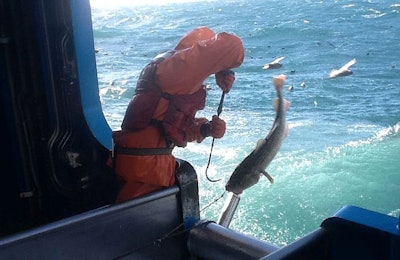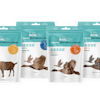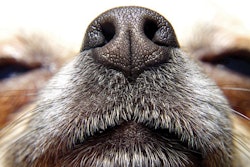
Consumers increasingly scrutinize pet foods’ supply chains to make sure products’ ingredients do not imperil workers’ lives and liberty. To meet this challenge (and perhaps help themselves sleep at night), pet food professionals work to ensure that ingredient suppliers respect human rights. For example, Nestlé Purina PetCare has taken action to ensure the freedom and welfare of the people who catch the fish used in its dog and cat foods.
“Forced labor and human rights abuses have no place in our supply chain,” Jack Scott, vice president of sustainability, Nestlé Purina, said.
Likewise, one of Purina’s dog and cat food ingredient suppliers benefits local indigenous communities, safeguards Alaskan cod fisheries and minds workers' well-being on arduous sea voyages.
“Purina has made a dedicated effort to procure 100-percent sustainable Alaska seafood and wrote a long-term contract with us that started about 4 years ago,” said Keith Singleton, president of the value-added division of Alaskan Leader Seafoods. “Our ships are crewed by 100-percent U.S. fishermen and women. Our fish catch is also third party audited through the Marine Stewardship Council (MSC) traceability program. All of our vessels are Coast Guard inspected and USDC inspected.”
History of labor abuses in pet food supply chain
Serendipitously, shortly after Purina made their contract with Alaskan Leader, investigative journalists boosted pet owners’ awareness of slavery on fishing vessels, which increased demands that companies ensure workers' rights in the pet food supply chain.
“Forced labor and human rights abuses have no place in our supply chain,” Jack Scott, vice president of sustainability, Nestlé Purina, said.
In 2015, the New York Times published the story of enslaved fishermen laboring on Thai fishing vessels that supplied both the human and pet food markets. This report led to class action lawsuits against Nestlé Purina, Mars Petcare and Big Heart Pet Brands (J.M. Smucker). In July 2018, the Ninth Circuit United States Court of Appeals judges dismissed these lawsuits.
“Given the actions that we have taken to date, we are confident that seafood products from problematic Thai fishing vessels are not entering our supply chain,” Scott said.
In 2017, Mars and Nestlé announced plans to ensure their pet food supply chains are free of human rights abuses and illegally caught seafood. Nestlé committed to a full ban on transshipment at sea in its supply chains, which is when a fish are transferred from one ship to another. Activists protest transshipment’s connections to human rights abuse, including slave labor, and the potential for fishing vessels to unload illegally caught loads into supply chains, away from port authorities.
Mars also committed to suspend the use of transshipped products in its supply chains if its seafood suppliers cannot adequately address the human rights and illegal fishing issues associated with the practice.
Pet food company avoids ongoing seafood fishing slavery
Despite global attention, a January 2018 report by Human Rights Watch found that forced labor on these fishing boats continues. Although the abuses persist, pet food companies have taken action to avoid this seafood caught by slaves.
“Our mandatory Nestlé Responsible Sourcing Standard requires all of our suppliers to respect human rights and to comply with international standards and all applicable labor laws.”
Purina’s rejection of transshipment at sea has worked out for the company.
“Through this and other actions as part of the Nestlé Thailand Seafood Action Plan, we have achieved 99-percent traceability back to vessels or farms,” Scott said. “Nestlé has joined the Seafood Task Force, an international industry alliance including retailers, manufacturers, governments and NGOs. It aims to ensure that Thailand’s seafood supply chain is free from illegal and forced labor through greater accountability, verification and transparency. In addition, Nestlé is a signatory to the Consumer Goods Forum joint resolution to fight forced labor issues throughout global supply chains.”
Purina’s suppliers are critical to delivering high quality products, said Scott, which includes standards around labor and working conditions. The company examines the entire supply chain to understand every input into the processes. That involves full traceability, learning about origin points of each raw material and every touch point in between.
“The assessment process for a new supplier can take anywhere from six to 12 months, and we have ongoing monitoring and assessments at set frequencies based on the individual ingredient,” he said.
Pet food ingredient supplier helps environment and indigenous people
Alaskan Leader Seafoods went through that process when they were in the process of becoming a cod supplier for Purina, Singleton said. Purina representatives flew out to a remote Alaskan village where (for lack of a hotel) they stayed with indigenous people who have been surviving in the harsh Arctic environment for centuries, while safeguarding the fisheries. After touring one of Alaskan Leader’s vessels, Purina accepted the company as a supplier.
Like the native people who hosted the Purina representatives, Alaskan Leader also endeavors to maintain the fishery from which the company profits. Some of those profits flow back into local communities.
“Our company is half owned by an Alaskan native corporation, which gives us direct access to coastal community members with many who actually have fishing backgrounds,” Singleton said. “This is a direct economic benefit to those communities through jobs, internships and shared prosperity through our partnership and Foundation.”
For example, Alaskan Leader helped fund First Light, an exhibition and workshop of indigenous art and traditions. The event included mask carving, kayak building, photography, basket weaving, carving and other arts. The event is now self-sustaining.
Alaskan Leader also employs native Alaskans through an internship program that employs six to nine people.
“They are very good at fishing these waters, which makes sense, since they’ve been doing it for 10,000 years,” Singleton said.
To ensure that Alaskan Leader and others also can harvest cod for 10,000 years, the company follows procedures designed to be ecologically sustainable. The company targets a school of cod using sonar, then uses hook and line fishing, as opposed to trawling, to avoid disturbing and damaging the sea floor.
Alaskan Leader’s vessels use an automatic bating device to affix sustainably caught Argentinian squid to hooks, Singleton said. Even with this mechanization, hook and line fishing is more labor intensive, but it’s eco-friendly.
“It is written in the State of Alaska Constitution that all fisheries are required to be sustainable, said Singleton. “We as fishermen are monitored by National Marine Fisheries Services Enforcement Division and must play by the quota harvesting rules which is electronically monitored though satellite communication daily.”
That focus on environmental effects led to the Alaskan Pacific cod fishery being recognized by the Monterey Bay Aquarium Seafood Watch program as a “best choice” for sustainable seafood.
“At Alaskan Leader, we are very proud of our status of being awarded best choice by our hook and line environmentally safe fishing methods. I think Purina recognizes that this method is a huge quality benefit and enjoys knowing that their raw materials are coming by way of a third-party audit like Seafood Watch. These efforts tend to stabilize markets and offers consistency.”
While minding the welfare of the sea life, Alaskan Leader also tries to keep workers’ well-being in mind, he said.
“The at-sea jobs have long hours and are physically demanding so we encourage our crews to stay in touch with family members,” Singleton said. “We have WiFi onboard and pay phones and they can buy tokens for that. In the event of a life-threatening illness or injury, we have the United States Coast Guard standing by to airlift someone that needs immediate medical attention.”
Methods to ensure ethical sourcing of seafood ingredients
Alaska Leader may be taking care of its workers, but not every pet food company can fly representatives to Alaska to check on the conditions aboard vessels supplying fish used in dog and cat foods. For those companies, other methods are available.
“It's not enough to have a blanket commitment to no forced labor at HQ level however, because this problem exists precisely because of lack of oversight at the base of the supply chain,” Nakamura said.
A team of scientists and human rights advocates developed Labor Safe Screen, a method for determining if pet food ingredient supply chains involve slavery, sex trafficking, forced labor and other unethical activities. The team used a five-point method to search for abuses in the seafood industry. However, the system would work for other types of human and pet food, as well as sustainability and environmental concerns.
“It's a workable approach to learning about conditions of production around any parameters you can learn about by talking to people,” Katrina Nakamura, Ph.D., founder of the Sustainability Initiative, told Petfood Industry.
“It's not enough to have a blanket commitment to no forced labor at HQ level however, because this problem exists precisely because of lack of oversight at the base of the supply chain,” she said. “It comingles with the profits that derive from being able to cheaply source untraceable raw materials. The risks to business of ties to slavery and illegal fishing in their goods is the flipside of the profit margin many have enjoyed by sourcing supplies with no accountability to frontline conditions for people and the environment.”
Another tool is Monterey Bay Aquarium Seafood Watch’s Seafood Slavery Risk Tool, a database to help pet food companies assess the risk of specific fish species or products, such as fishmeal, being associated with forced labor.
While slavery and other human rights abuses may continue indefinitely, pet food companies can avoid supporting such practices by using tools like the Labor Safe Screen and buying raw materials from suppliers like Alaskan Leader.
Learn more about ethical sourcing of pet food ingredients:
www.PetfoodIndustry.com/articles/7622

















